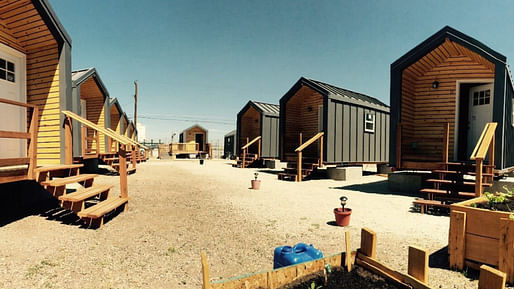

The Denver City Council voted Monday night to approve changes to the city’s zoning code to help welcome temporary tiny home villages hoping to use vacant land to help address homelessness...The city voted to approve the Beloved Community Village. According to the release, it was Denver’s first temporary tiny home village and is a successful pilot of using tiny homes to help vulnerable or marginalized residents aiming to find permanent homes. — FOX
"In residential zone districts, these villages must be located on the grounds of a public, civic or institutional use, such as a school, church or community center," Fox reports. The tiny home villages will be able to remain in these locations temporarily for up to four years, it is a creative approach to the problem of homelessness in major cities. Based on the outcome it will be interesting to see if more will follow.
This is a nice small step. It still ghetto-izes a group, which is intuitively not the way to go. The trailer park comment is not far off, chemex.
The Japanese system I live in is super mixed by its nature, so people paying 4500/mo rent live next to people paying 600/mo rent, without any problems. The quality of homes is different of course, but this is normal in the libertarian hyper-capitalist society that Japan is at its core. Multi-million dollar homes sit next to low income housing as well. It all depends on what the land owners want to do. And of course it only works because low income does not mean stupid, bad or lazy. However we dont have as much income disparity here as in the USA and society is simply more orderly. So maybe thats why it works here...
It would be nice to learn that North America could achieve the same mix, because it would mean more opportunity for everyone involved. I have a feeling that in American culture they will need to add a layer of community and support to keep it going. The article says that is the plan. Yet the fear of failure is clear, with the 4 year limit baked in. Just in case they need to hit reset, presumably. Hopefully that is not also an indication of the degree of commitment to the project.
All 9 Comments
I’m glad trailer parks look better now
This is a nice small step. It still ghetto-izes a group, which is intuitively not the way to go. The trailer park comment is not far off, chemex.
The Japanese system I live in is super mixed by its nature, so people paying 4500/mo rent live next to people paying 600/mo rent, without any problems. The quality of homes is different of course, but this is normal in the libertarian hyper-capitalist society that Japan is at its core. Multi-million dollar homes sit next to low income housing as well. It all depends on what the land owners want to do. And of course it only works because low income does not mean stupid, bad or lazy. However we dont have as much income disparity here as in the USA and society is simply more orderly. So maybe thats why it works here...
It would be nice to learn that North America could achieve the same mix, because it would mean more opportunity for everyone involved. I have a feeling that in American culture they will need to add a layer of community and support to keep it going. The article says that is the plan. Yet the fear of failure is clear, with the 4 year limit baked in. Just in case they need to hit reset, presumably. Hopefully that is not also an indication of the degree of commitment to the project.
Totally agree with the ghettoizing comment. This kind of thing needs to be spread out through zoning so we see each other daily. Harder to dehumanize people you see walk ing around.
This is stupid... eliminating single family zoning would be a real step towards addressing the housing crisis in many US cities including Denver.
These would make a nice tool shed for my backyard.
These are mobile homes, and this is a picture of a trailer park. What about water and sewage? What about outside storage? Where do people park? I've lived in a trailer park. All the jokes are true.
The homeless populations have a significant component of the seriously mentally ill and chronic drug users. Putting these trailers on school grounds is one of the most insane ideas I have ever heard of.
Architectural design is only a small fraction of solving homelessness problem. There are already hundreds of good solutions from tiny homes to mobile homes. Where are the fighting will power, state mandates and, financial resources?
It wouldn't take much to adapt the Katrina Cottage designs to reflect the Victorian influence of the early days of Denver and the nearby mining towns. The structures at the start of the article are just rubbing the noses of the homeless in their plight.
Housing the (habitually) homeless and creating affordable housing are largely apples and oranges. 70% of the US homeless are individuals. The 30% which are families (which has risen substantially over the past 2 decades) would require a different response. Systemic and long term lack of affordable housing often leads to habitual homelessness and other horrible societal/personal problems beyond the scope of architecture. I'm not sure this single image, which provokes the set of a spaghetti western from the 1970s, does the project justice, as I'm sure there is much social programming associated with it. That said, someone clearly had an interesting sense of humor with the potted solar "street lights".
Block this user
Are you sure you want to block this user and hide all related comments throughout the site?
Archinect
This is your first comment on Archinect. Your comment will be visible once approved.